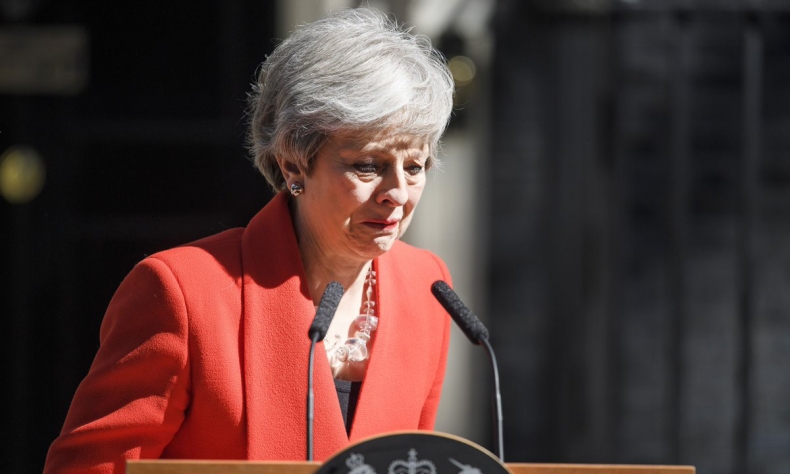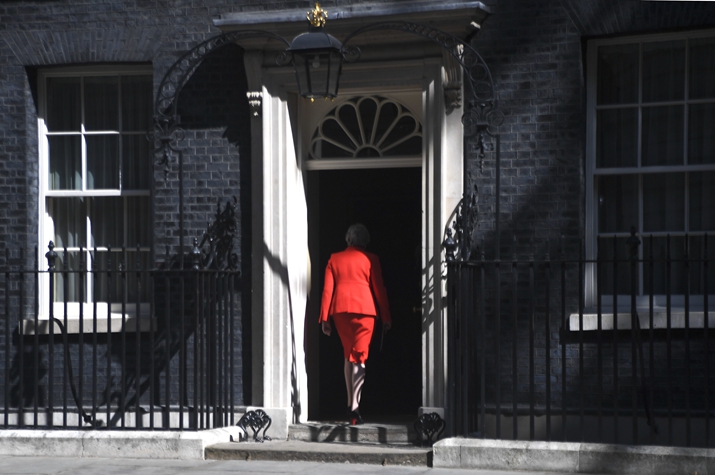
A Time of Reckoning
If May’s successor fails to deliver a smooth Brexit, it might spell the end of Britain’s ruling Conservative Party.
Controversial 20th-century British politician Enoch Powell once noted that all political careers in Great Britain end in tears. With Theresa May, his words proved true not just figuratively but literally.
As the British prime minister announced on May 24 that she would step down on June 7, observers could see her face consumed with emotion and tears well up in her eyes. It was a bathetic note to end a chaotic, and for many, inglorious, period.
The consensus among commentators was that May had been dealt a poor hand when she succeeded David Cameron as prime minister in 2016, but played it remarkably badly. Her almost three years in office were consumed by the issue of Brexit. Despite this, she leaves her successor the question of how exactly this will be achieved.
Strategic Errors
May made a number of serious strategic mistakes as she attempted to fulfil the outcome of the June 2016 referendum for the UK to exit the European Union (EU). While the exercise gave a mandate to depart, it infamously did not say where exactly everyone was heading. As May discovered, there were a huge range of options, none of which gained wide public support. She proved a poor salesperson for one form of Brexit everyone could, up to a degree, accept.
When May became prime minister, unopposed, in the summer of 2016, even those who had voted to remain were willing to grudgingly admit that the huge democratic exercise had produced a result that needed to be implemented. In those early months, May had the opportunity to persuade, cajole and generally do what politicians are meant to–promote a specific policy outcome through good communication and conviction.

May’s initial move, however, as a remain voter was to try to prove to her own party that she was a true convert to the Brexit cause. Her hard-line comments at the Conservative Party conference in the autumn of 2016 that “Brexit meant Brexit” and there could be no compromises were the first warning that she would be a hostage to fortune. Events were to unfold with an almost Grecian tragic inevitability after that.
First was the decision to trigger the infamous Article 50 from the EU’s Lisbon Treaty of 2009 that, very briefly, sets out the mechanism by which EU member states could leave. The sole stipulation in this is that the process would take two years, with no detail about exactly how this is to be achieved. Before having a clear battle plan, and largely pressurised by hardliners in her party, May triggered the article in March 2017. From that moment, she lost control of one of the few levers she had–a time frame.
Her second mistake was to underestimate the complexity of the Northern Ireland border issue. In Northern Ireland, consumed by sectarian strife for much of 1969 onwards, the Good Friday Agreement of 1998 had cemented a sustainable peace. But this was dependent on there being no hard border between Northern Ireland, which remained under British rule, and the Republic of Ireland in the south. With the desire to have complete separation from the EU common market and customs union, May’s negotiators faced the intractable problem of either needing a hard border with customs controls in Ireland, or not having one but getting some kind of membership of the EU market.
A mechanism to handle this, which committed to a soft border but under an undefined time frame, was one of the many aspects of the final deal that she managed to negotiate with the EU and put before parliament in late 2018. The rejection of that by the largest-ever opposing vote–over 230–would have spelt the end of most leaders. But so extraordinary were the times in which she was prime minister that she was in effect able to place the same deal before the House of Commons, the chief legislative body, a further two times. Her final fall was due to a further attempt to try to pass this deal. That proved inacceptable even to her staunchest supporters.
A Divided Society
May showed incredible resilience in the face of a parliament and a party often at war with itself, with deep divisions that seemed to worsen rather than improve. The Conservative Party has been split for many decades between those who are supportive of the EU and its membership, and those who regard it as an affront to sovereignty and a Brussels-led, continental-style super state hoping to reduce the UK to servitude.
On the one side, the onus is on pragmatism, looking at the economic benefits that membership of the EU gives. For the other, however, identity is all important. These divisions are reflected in the wider society. In effect, they pit against each other two groups that simply do not speak the same language. No wonder it proved hard for May to even come close to brokering a compromise.
Her own position changed during the brief period of her premiership, as she recognized the massive challenges facing the UK in its quest to leave. Far from fragmenting, the rest of the EU remained consistent in their set of demands, giving May little space for negotiation. She was not helped by the maverick, and often (at least for her) unhelpful leadership in the U.S. after 2017 and the arrival of U.S. President Donald Trump.
Trump’s grand declarations about her just needing to leave the union with no fear for the consequences were not the sentiments of the majority of the British people, who showed that they did care about their economic prosperity in the future and the threat to this a no deal exit posed. For others, their sincere belief was that there were opportunities outside the market that the EU offered. But as of mid-2019, these look elusive.
May’s exit will leave Brexit no closer to a solution than it was almost three years ago. Her successor will need to find the consensus she failed to, or deal with implementing something that is as likely to antagonize and anger as many people as it pleases. Even worse, there is every possibility that the final outcome will disappoint everyone.
A Thorny Succession
May has made her exit at the right moment. There is clearly a huge reckoning building up for politicians who are now largely viewed as incompetent, and driven by self-interest rather than the good of the nation. However the deepest anger will perhaps be for those whose promises, arguments and declarations, given with such confidence over the last few years, about how easy leaving the EU is and how things will eventually be fine have had such a huge impact.
If Brexit is forced through on a no-deal basis, and there are immediate negative economic consequences, then the era of Theresa May could well be looked back on with some nostalgia. And unlike some of her predecessors, like Tony Blair and Cameron, she will at least enjoy some sympathy as a person who tried to do her best in impossible circumstances.
Such charitable indulgence will almost certainly not be accorded to her successor and there is every chance that the Conservative Party, after three centuries as a political force in the UK, may well be consigned to minority party status, or even to outright oblivion.
The author is an op-ed contributor to Beijing Review and director of the Lau China Institute at King’s College, London
 Facebook
Facebook
 Twitter
Twitter
 Linkedin
Linkedin
 Google +
Google +










